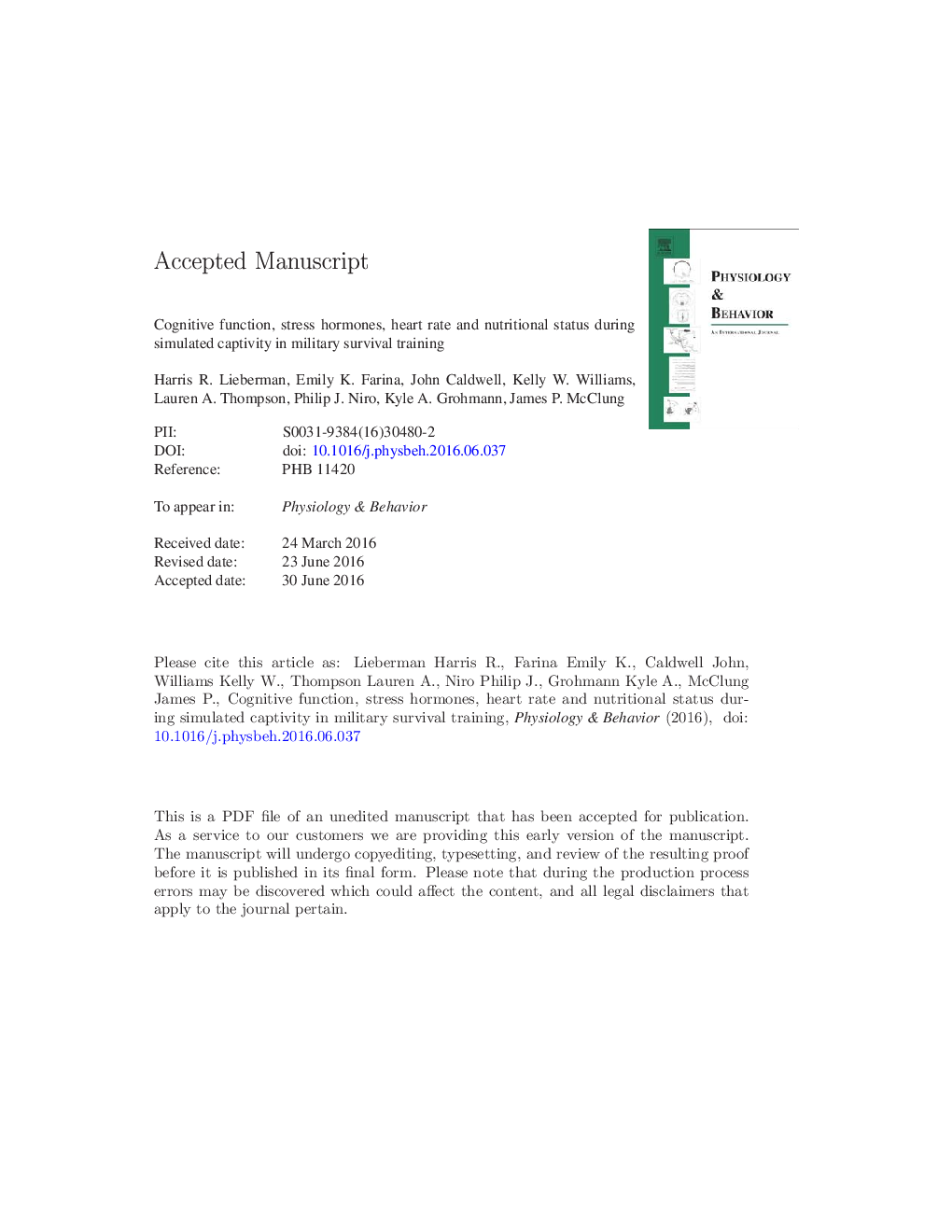| کد مقاله | کد نشریه | سال انتشار | مقاله انگلیسی | نسخه تمام متن |
|---|---|---|---|---|
| 5922763 | 1571154 | 2016 | 52 صفحه PDF | دانلود رایگان |
عنوان انگلیسی مقاله ISI
Cognitive function, stress hormones, heart rate and nutritional status during simulated captivity in military survival training
ترجمه فارسی عنوان
عملکرد شناختی، هورمون های استرس، ضربان قلب و وضعیت تغذیه در طی شبیه سازی اسلحه در آموزش بقای نظامی
دانلود مقاله + سفارش ترجمه
دانلود مقاله ISI انگلیسی
رایگان برای ایرانیان
موضوعات مرتبط
علوم زیستی و بیوفناوری
بیوشیمی، ژنتیک و زیست شناسی مولکولی
فیزیولوژی
چکیده انگلیسی
Stress influences numerous psychological and physiological processes, and its effects have practical implications in a variety of professions and real-world activities. However, few studies have concurrently assessed multiple behavioral, hormonal, nutritional and heart-rate responses of humans to acute, severe stress. This investigation simultaneously assessed cognitive, affective, hormonal, and heart-rate responses induced by an intensely stressful real-world environment designed to simulate wartime captivity. Sixty males were evaluated during and immediately following participation in U.S. Army Survival, Evasion, Resistance, and Escape (SERE) school, three weeks of intense but standardized training for Soldiers at risk of capture. Simulated captivity and intense mock interrogations degraded grammatical reasoning (p < 0.005), sustained-attention (p < 0.001), working memory (p < 0.05) and all aspects of mood assessed by the Profile of Mood States (POMS) questionnaire: Tension/Anxiety, Depression/Dejection, Anger/Hostility, Vigor/Activity, Fatigue/Inertia; Confusion/Bewilderment, and Total Mood Disturbance (p < 0.001) It also elevated heart rate (p < 0.001); increased serum and salivary cortisol and dehydroepiandrosterone-sulfate (DHEA-s) (p < 0.01); elevated serum epinephrine, norepinephrine, and soluble transferrin receptors (sTfR) (p < 0.01); increased salivary neuropeptide-Y (NPY) (p < 0.001); and decreased serum prolactin and serum and salivary testosterone (p < 0.001). Partial recovery was observed immediately after training, but stress-induced changes, particularly in body weight and several of the biomarkers, persisted. This study demonstrates that when individuals were exposed to realistic and controlled simulated captivity, cognition, mood, stress hormones, nutritional status and heart rate are simultaneously altered, and each of these subsequently recovers at different rates.
ناشر
Database: Elsevier - ScienceDirect (ساینس دایرکت)
Journal: Physiology & Behavior - Volume 165, 15 October 2016, Pages 86-97
Journal: Physiology & Behavior - Volume 165, 15 October 2016, Pages 86-97
نویسندگان
Harris R. Lieberman, Emily K. Farina, John Caldwell, Kelly W. Williams, Lauren A. Thompson, Philip J. Niro, Kyle A. Grohmann, James P. McClung,
